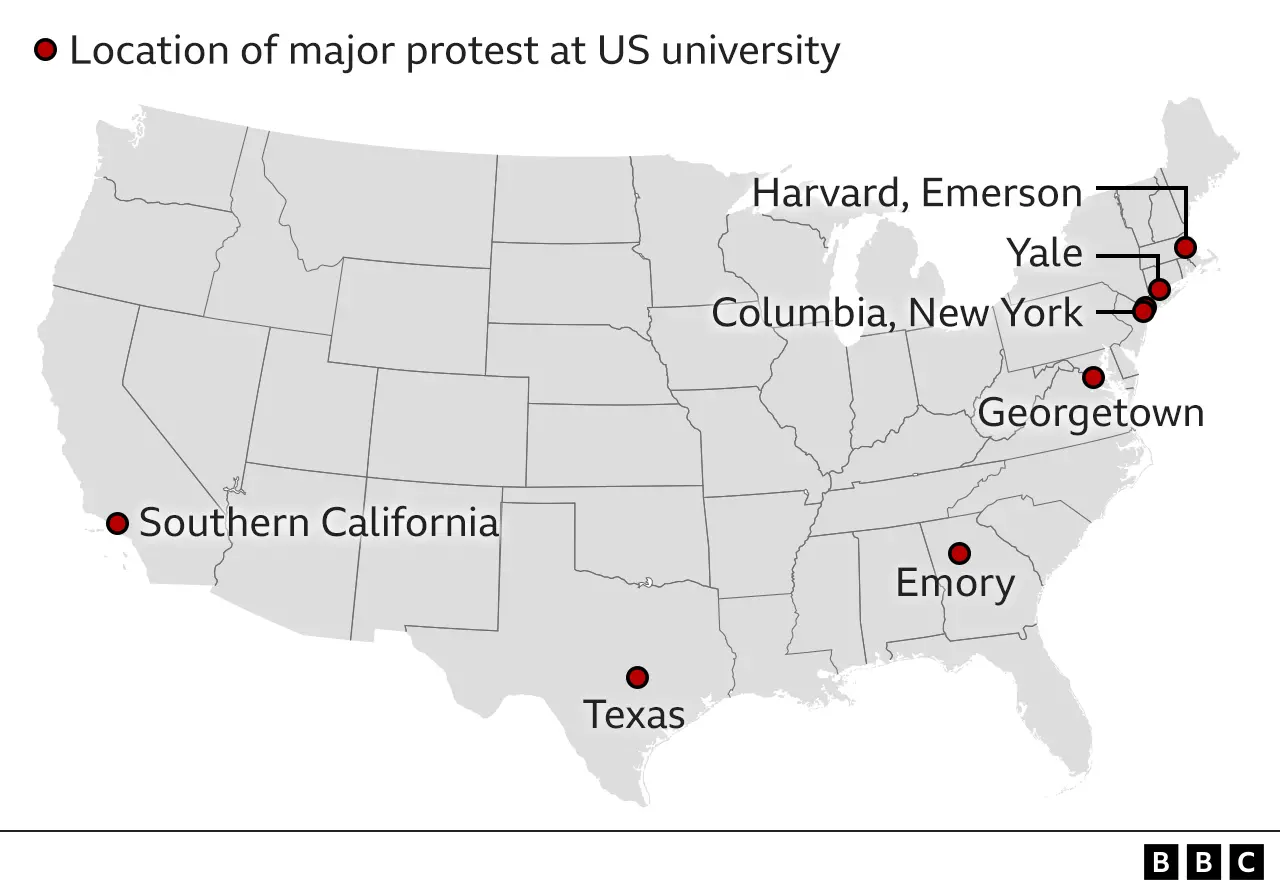
Protests calling for universities to boycott companies and individuals with ties to Israel amid the ongoing war there have swept college campuses across the US.
Tensions have been escalating at universities in the wake of the 7 October attack by Hamas that left around 1,200 people dead in Israel, and led to Israel's assault on Gaza that has killed more than 34,000 Palestinians.
Major encampments and protests were seen first at Columbia University in New York, but have since erupted elsewhere across the country.
Students have been arrested at campuses in Los Angeles, California and in Atlanta, Georgia.
In Austin, Texas, the governor ordered state troopers to arrest protesters.
With protests now ongoing at over two dozen campuses, here are where some of the largest are taking place:
Columbia was the first university to see a major pro-Palestinian encampment form on campus, and among the first to be accused of antisemitism.
More than 100 protesters were arrested last week after the Ivy League university's president asked police to clear the protest site. Her request followed her testimony to Congress about the university's response to alleged antisemitism on campus.
But the mass arrests appear to have galvanised the movement, according to demonstrators who remained onsite one week later.
Democratic Rep. Ilhan Omar, whose daughter was arrested at Columbia, told BBC News the movement started with just a few students but quickly spread due to the mass arrests.
"This is a movement that started with only 70 students," she told BBC News at Columbia on Thursday.
"And because Columbia University decided to crack down on them and violate their First Amendment, this has now spread nationally and internationally."
In Atlanta, several dozen protesters "not affiliated" with Emory University set up tents on campus early Thursday morning, the school said in a statement.
Administrators said the group of trespassers was later joined by members of the university community. But when the protesters refused to disperse, the Emory Police Department "took a couple dozen people into custody".
The statement did not clarify how many arrests were made and which charges the suspects could face.
The decision by the University of Southern California to cancel the valedictorian's speech at commencement - followed by its cancellation of the main 10 May commencement - led to outrage on campus.
The ceremony was expected to draw some 65,000 people to campus.
The valedictorian, who was chosen due to high grades and involvement in campus life, had posted a link to a website that was critical of Israel, which led to recent accusations of antisemitism.
The university said the cancellation was due to unspecified threats to campus security and did not condemn the student's post.
But the decision angered both pro- and anti-Israel demonstrators. Pro-Palestinian protesters called for the student, who is Muslim, to deliver her speech.
Pro-Israel students called for the school to condemn her posts.
On Wednesday, the Los Angeles Police Department was called in and arrested 93 people.
Georgetown University in Washington DC saw encampments being set up on Thursday.
At least 20 tents have been erected on the university's normally quiet campus in northwest DC.
It came as hundreds of students and faculty members held a march from Georgetown to nearby George Washington University.
At the nearby American University, a group of students protested outside the office of the school's president the day before.
No arrests have been made.
Police said 57 arrests were made on Wednesday night at the University of Texas (UT) in Austin.
Troopers with the Texas Department of Public Safety wearing riot gear were seen using their bikes to push protesters back.
Texas Republican Governor Greg Abbott, who called in the troopers, posted on X that the protests are antisemitic and called for student protesters to be expelled.
Democrats in the state accused him of using the mass arrests as a "campaign ad".
The state National Guard issued a statement denying that it had been mobilised to make arrests on campus.
"While the Texas National Guard was aware and prepared to respond to the protests at UT yesterday, no Soldiers were dispatched to the campus during the event," the Texas Military Department said in a statement.
It added that the force is prepared to "respond if requested".
On Monday, police arrested 120 people who erected an impromptu encampment the downtown Manhattan campus.
All but four of those arrested were charged with trespassing.
On Wednesday, encampments formed in Harvard Yard after the university administration suspended the student group the Harvard Undergraduate Palestine Solidarity Committee.
Harvard's president has refused to rule out asking the police to respond.
No arrests have been made.
Protests have been seen at a least two dozen universities, and even in some high schools around the US.
In Boston, 108 people were arrested at Emerson University early Thursday morning, leading the university to cancel classes. Four police officers were injured during the protest.
In Connecticut, protests are ongoing at Yale University, even after 48 people were arrested on Wednesday. All but four of those arrested were Yale students.
On Tuesday, high schoolers in the Seattle area walked out of classes in protest against the war. School officials in New Jersey have sternly warned high school students there against taking part in a walk out planned for Friday.